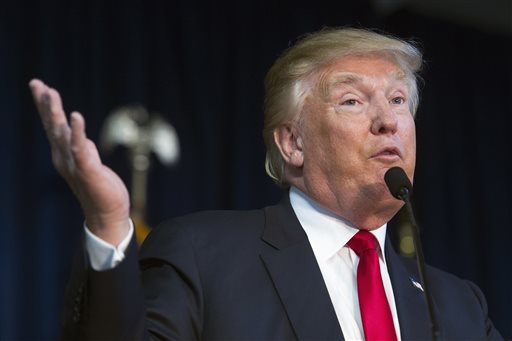
MIAMI (AP) — Donald Trump claimed six Republican victories on Super Tuesday as the New York businessman extended his dominance in the 2016 primary.
At the same time, the GOP leaders’ search for any viable alternative to Trump suffered a fresh setback, with both Ted Cruz and Marco Rubio vowing to fight on despite underwhelming performances on the biggest day of voting so far. Cruz avoided disaster by winning his home state of Texas and neighboring Oklahoma, while Rubio has yet to score a win through 15 primary contests in the 2016 primary season.
Shrugging off a racially charged feud from earlier in the week, a confident Trump looked ahead to the general election in a victory speech at his Mar-a-Lago estate in Florida: “We’re going to be more inclusive,” he declared. “We’re going to be more unified.”
Contests in Vermont and Minnesota remain too close to call, while voting continued in Alaska.
Trump scored victories in Georgia, Virginia, Arkansas, Alabama, Tennessee and Massachusetts, tightening his grasp on his party’s nomination on a Super Tuesday marked by panic from Republican leaders.
Fearing Trump may build an insurmountable delegate lead, top Republican officials lashed out at the billionaire businessman’s command of the issues and “seeming ambivalence” over white supremacists as voting began.
Trump’s aggressive plans for Muslims and immigrants have resonated with Tuesday’s Republican electorate, according to exit polls conducted by Edison Research for The Associated Press and television networks. Large majorities of Republican primaryvoters in six states, for example, said they support Trump’s proposal to temporarily ban all non-citizen Muslims from entering the United States.
The results followed a wild prelude to Super Tuesday that featured extraordinary criticism from several Republican governors and senators who refused to say whether they would support their party’s front-runner should Trump win the nomination.
Trump’s strong performance across much of the South was a blow to Cruz, who had long expected the South to be his firewall.
Yet Cruz seized on Rubio’s struggles, calling on the GOP to unify behind his candidacy, “the only campaign that has beaten, that can beat and that will beat Donald Trump.”
Rubio hoped to stay competitive in the delegate count while eyeing a win in his home state of Florida on March 15. Republican officials have rallied behind Rubio over the last week, but that did little to help him Tuesday.
A defiant Rubio told a hometown crowd in Miami that he had only begun to attack Trump: “You see, just five days ago we began to unmask the true nature of the front-runner so far in this race,” he said, calling the GOP front-runner “a con artist.”
Ohio Gov. John Kasich and retired neurosurgeon Ben Carson remain in the race, but neither is expected to be a major factor onSuper Tuesday.
Trump won at least 139 Super Tuesday delegates, while Ted Cruz has won at least 52.
There are 595 Republican delegates at stake in 11 states. Rubio won at least 25 delegates and John Kasich has won at least 13. So far, Ben Carson has picked up two delegates in Virginia
Overall, Trump leads with 221 delegates. Cruz has 69, Rubio has 41, Kasich has 19 and Carson has seven. It takes 1,237 delegates to win the Republican nomination for president.
Envisioning a Trump White House, the front-runner said he would get along “great with Congress,” despite Tuesday criticism from House Speaker Paul Ryan and Senate Majority Leader Mitch McConnell, who condemned his Sunday refusal to disavow the backing of a former Ku Klux Klan leader. Trump has since disavowed the nod.
“Paul Ryan, I don’t know him well, but I’m sure I’m going to get along great with him,” Trump said. “And if I don’t, he’s going to have to pay a big price, OK?”
____
Peoples reported from Washington. Associated Press writers Stephen Ohlemacher in Washington, Jill Colvin in Palm Beach, Florida, and Bob Salsberg and Phillip Marcelo in Boston contributed to this report.
Copyright 2016 The Associated Press. All rights reserved.



